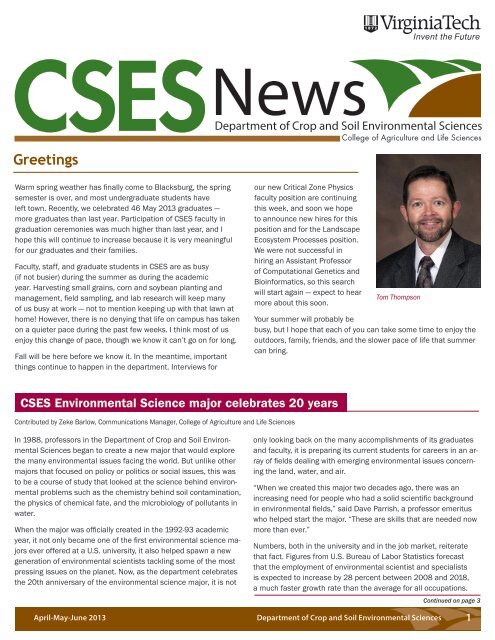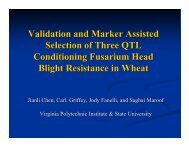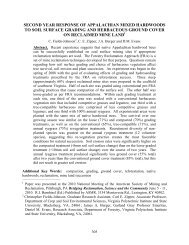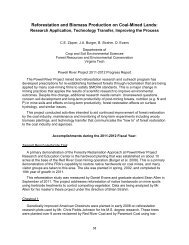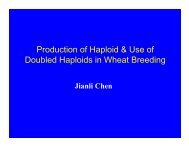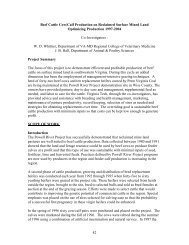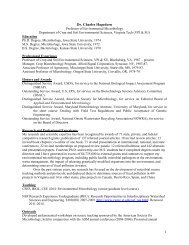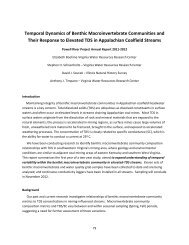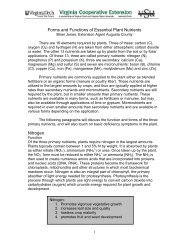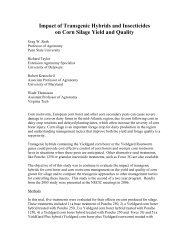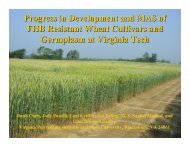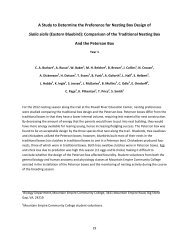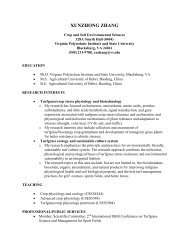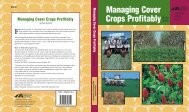2013 Apr-Jun Newsletter - Department of Crop & Soil Environmental ...
2013 Apr-Jun Newsletter - Department of Crop & Soil Environmental ...
2013 Apr-Jun Newsletter - Department of Crop & Soil Environmental ...
Create successful ePaper yourself
Turn your PDF publications into a flip-book with our unique Google optimized e-Paper software.
News<br />
<strong>Department</strong> <strong>of</strong> <strong>Crop</strong> and <strong>Soil</strong> <strong>Environmental</strong> Sciences<br />
Greetings<br />
Warm spring weather has finally come to Blacksburg, the spring<br />
semester is over, and most undergraduate students have<br />
left town. Recently, we celebrated 46 May <strong>2013</strong> graduates —<br />
more graduates than last year. Participation <strong>of</strong> CSES faculty in<br />
graduation ceremonies was much higher than last year, and I<br />
hope this will continue to increase because it is very meaningful<br />
for our graduates and their families.<br />
Faculty, staff, and graduate students in CSES are as busy<br />
(if not busier) during the summer as during the academic<br />
year. Harvesting small grains, corn and soybean planting and<br />
management, field sampling, and lab research will keep many<br />
<strong>of</strong> us busy at work — not to mention keeping up with that lawn at<br />
home! However, there is no denying that life on campus has taken<br />
on a quieter pace during the past few weeks. I think most <strong>of</strong> us<br />
enjoy this change <strong>of</strong> pace, though we know it can’t go on for long.<br />
Fall will be here before we know it. In the meantime, important<br />
things continue to happen in the department. Interviews for<br />
our new Critical Zone Physics<br />
faculty position are continuing<br />
this week, and soon we hope<br />
to announce new hires for this<br />
position and for the Landscape<br />
Ecosystem Processes position.<br />
We were not successful in<br />
hiring an Assistant Pr<strong>of</strong>essor<br />
<strong>of</strong> Computational Genetics and<br />
Bioinformatics, so this search<br />
will start again — expect to hear<br />
more about this soon.<br />
Tom Thompson<br />
Your summer will probably be<br />
busy, but I hope that each <strong>of</strong> you can take some time to enjoy the<br />
outdoors, family, friends, and the slower pace <strong>of</strong> life that summer<br />
can bring.<br />
CSES <strong>Environmental</strong> Science major celebrates 20 years<br />
Contributed by Zeke Barlow, Communications Manager, College <strong>of</strong> Agriculture and Life Sciences<br />
In 1988, pr<strong>of</strong>essors in the <strong>Department</strong> <strong>of</strong> <strong>Crop</strong> and <strong>Soil</strong> <strong>Environmental</strong><br />
Sciences began to create a new major that would explore<br />
the many environmental issues facing the world. But unlike other<br />
majors that focused on policy or politics or social issues, this was<br />
to be a course <strong>of</strong> study that looked at the science behind environmental<br />
problems such as the chemistry behind soil contamination,<br />
the physics <strong>of</strong> chemical fate, and the microbiology <strong>of</strong> pollutants in<br />
water.<br />
When the major was <strong>of</strong>ficially created in the 1992-93 academic<br />
year, it not only became one <strong>of</strong> the first environmental science majors<br />
ever <strong>of</strong>fered at a U.S. university, it also helped spawn a new<br />
generation <strong>of</strong> environmental scientists tackling some <strong>of</strong> the most<br />
pressing issues on the planet. Now, as the department celebrates<br />
the 20th anniversary <strong>of</strong> the environmental science major, it is not<br />
only looking back on the many accomplishments <strong>of</strong> its graduates<br />
and faculty, it is preparing its current students for careers in an array<br />
<strong>of</strong> fields dealing with emerging environmental issues concerning<br />
the land, water, and air.<br />
“When we created this major two decades ago, there was an<br />
increasing need for people who had a solid scientific background<br />
in environmental fields,” said Dave Parrish, a pr<strong>of</strong>essor emeritus<br />
who helped start the major. “These are skills that are needed now<br />
more than ever.”<br />
Numbers, both in the university and in the job market, reiterate<br />
that fact. Figures from U.S. Bureau <strong>of</strong> Labor Statistics forecast<br />
that the employment <strong>of</strong> environmental scientist and specialists<br />
is expected to increase by 28 percent between 2008 and 2018,<br />
a much faster growth rate than the average for all occupations.<br />
Continued on page 3<br />
<strong>Apr</strong>il-May-<strong>Jun</strong>e <strong>2013</strong> <strong>Department</strong> <strong>of</strong> <strong>Crop</strong> and <strong>Soil</strong> <strong>Environmental</strong> Sciences 1
New CSES faculty spotlight<br />
Bo Zhang<br />
Bo Zhang grew up in a mountain town in Northeastern China,<br />
so Blacksburg makes her feel at home. Before joining our<br />
department, Zhang had been the lead scientist in charge <strong>of</strong><br />
the soybean breeding and genetics program at Virginia State<br />
University since <strong>Apr</strong>il 2011. Her program at VSU was the top<br />
vegetable soybean (edamame) breeding program in the U.S.,<br />
with long-breeding and abundant edamame germplasm.<br />
Before moving to Virginia, Zhang also had three-year industry<br />
experience with Bayer <strong>Crop</strong> Science as a molecular lab supervisor<br />
responsible for molecular marker-assisted selection in herbicide<br />
tolerant and disease resistant soybeans in De Witt, Ark.<br />
Zhang received her Ph.D. in 2006 in cell and molecular biology<br />
from University <strong>of</strong> Arkansas under Pengyin Chen, a former Hokie.<br />
She continued to work at the university as a postdoctoral research<br />
associate for another year and she was trained as a modern<br />
plant breeder with experiences on field selection and molecular<br />
technique application.<br />
Zhang’s research will focus on developing new, improved, and<br />
market-needed soybean cultivars adapted to Virginia and mid-<br />
Atlantic region. All elite varieties are selected through extensive<br />
testing in diverse locations in Virginia with the Eastern Virginia<br />
Agricultural Research and Extension Center in Warsaw, Va., as the<br />
main location. The specific interests <strong>of</strong> the soybean breeding team<br />
are:<br />
• Develop new and improved, conventional, and herbicidetolerant<br />
soybean varieties adapted to various production<br />
systems in Virginia and mid-Atlantic region.<br />
• Incorporate value-added traits to specialty soybeans to<br />
reinforce Virginia soybean growers’ competitive ability in<br />
various market.<br />
• Develop diverse soybean germplasm in yield, maturity, pest<br />
resistance, stress tolerance, value added traits, etc. to broad<br />
genetic background <strong>of</strong> soybean.<br />
• Utilize molecular techniques to modify seed compositions for<br />
seed quality improvement.<br />
Zhang moved to<br />
Blacksburg with her<br />
husband, Long, and<br />
their 4-year-old son,<br />
Youyou. Hiking is their<br />
favorite activity. She also<br />
likes practicing yoga for<br />
stress relief and overall<br />
health improvement,<br />
and she enjoys the<br />
boneless feeling after<br />
each yoga practice.<br />
Bo Zhang<br />
<strong>Crop</strong> and <strong>Soil</strong> <strong>Environmental</strong> Sciences<br />
<strong>2013</strong> graduates<br />
CSES is proud <strong>of</strong> its 46 spring <strong>2013</strong> graduates. The graduates<br />
were celebrated at a picnic in their honor on May 9.<br />
Graduate students:<br />
M.S. degrees: Aaron Bradner, Derik Cataldi, Jonathan Dickerson,<br />
Cristie Edwards, Amber Hickman, Gordon Jones, Justin Jones,<br />
Xiaojun Liu, John Parker, Nathaniel Reams, Julie Reimer, Devin<br />
Rippner, Karin Stretchko, Nicole Troyer<br />
Ph.D. degrees: Catherine Fleming, Jinling Li<br />
<strong>Crop</strong> and <strong>Soil</strong> Science undergraduates:<br />
Dalton Bennett, Austin Gardner, Jacob Heizer, Hayden Lyons***,<br />
Nicholas Polera, Kevin Steele, Wayne Webb Jr., Benjamin Williams*<br />
<strong>Environmental</strong> science undergraduates:<br />
Dana Bakirtjy, Mark Condron, Stephen Dix, Kathryn Gaasch, Emily<br />
Gorman, Lucie Law, James Linton, Jacqueline Mattingly, Jacob<br />
McGaughey, Matthew Medders, Reid Nebergall, Lana Parker,<br />
Joshua Ribelin**, Hillary Schmitthenner, Spencer Shanholtz***,<br />
Devon Taylor, Rachel Thomas, Benjamin Watson**<br />
Outstanding undergraduates:<br />
Spencer Shanholtz – ENSC and Hayden Lyons - CSS<br />
*Cum Laude; **Magna Cum Laude; ***Summa Cum Laude<br />
Visit our Facebook page at: <strong>Crop</strong> and <strong>Soil</strong> <strong>Environmental</strong> Science at Virginia Tech<br />
CSES News is produced by the Office <strong>of</strong> Communications and Marketing in the College <strong>of</strong> Agriculture and Life Sciences.<br />
VT/0613/CSES-58NP<br />
2 <strong>Department</strong> <strong>of</strong> <strong>Crop</strong> and <strong>Soil</strong> <strong>Environmental</strong> Sciences <strong>Apr</strong>il-May-<strong>Jun</strong>e <strong>2013</strong>
CSES Continued from page 1<br />
The number <strong>of</strong> students enrolled in the major has grown from a<br />
handful <strong>of</strong> students in 1992 to 150 today.<br />
“We have continued to grow because <strong>of</strong> the premium we place<br />
on the science behind human-caused impacts to our planet,”<br />
said Tom Thompson, head <strong>of</strong> the <strong>Department</strong> <strong>of</strong> <strong>Crop</strong> and <strong>Soil</strong><br />
<strong>Environmental</strong> Sciences. “This is a major for students who are<br />
passionate about science and realize the value <strong>of</strong> such an<br />
education.”<br />
From the coalfields <strong>of</strong> Virginia to the hills <strong>of</strong> Haiti’s Central Plateau,<br />
faculty are researching and teaching how to reclaim damaged<br />
land for agricultural, urban, and wildland purposes. Others are<br />
examining the sources and spread <strong>of</strong> water-borne pollutants and<br />
the best ways to mitigate damage to water bodies. And some are<br />
exploring the impact <strong>of</strong> climate change on crops that are going<br />
to become more stressed at a time when more food is needed to<br />
feed a growing population.<br />
I’ve always had a passion for the<br />
environment and I felt that this was<br />
the best way for me to contribute to<br />
the preservation <strong>of</strong> the health and<br />
integrity <strong>of</strong> the planet.<br />
—Kathryn Gaasch, <strong>2013</strong> <strong>Environmental</strong> Science graduate<br />
“There isn’t a subject in the arena <strong>of</strong> environmental science that<br />
we aren’t involved with today,” Thompson said. “We are preparing<br />
students for some <strong>of</strong> the most pressing problems out there.”<br />
Students like Kathryn Gaasch <strong>of</strong> Ellicott City, Md., got into the<br />
major because they have an equal interest in science and the<br />
environment.<br />
“I’ve always had a passion for the environment and I felt that this<br />
was the best way for me to contribute to the preservation <strong>of</strong> the<br />
health and integrity <strong>of</strong> the planet,” said Gaasch, a recent graduate.<br />
Publications<br />
Christopher, Mark D., Shuyu Liu, Marla D. Hall, David S. Marshall,<br />
Myron O. Fountain, Jerry W. Johnson, Eugene A. Milus, Kimberly<br />
A. Garland-Campbell, Xianming Chen, and Carl A. Griffey. <strong>2013</strong>.<br />
Identification and mapping <strong>of</strong> adult plant stripe rust resistance in<br />
s<strong>of</strong>t red winter wheat VA00W-38. <strong>Crop</strong> Sci. 52:1-9. doi: 10.2135/<br />
cropsci2012.02.0086.<br />
Berger, G., A. Green, W. Brooks, M. Vaughn, R. Pitman, W. Thomason,<br />
and C. Griffey. 2012. Yield potential <strong>of</strong> hulless versus hulled<br />
full-sib genotypes in four winter barley (Hordeum vulgare L.) populations.<br />
<strong>Crop</strong> Sci. doi: 10.2135/cropsci2012.10.0603.<br />
Renne, I.J., B.F. Tracy. <strong>2013</strong>. Disturbance intensity, timing and land<br />
use history interact to affect pasture weed invasion. Basic and Applied<br />
Ecology 14:44-53.<br />
Zipper, C.E., J.A. Burger, C.D. Barton, J.G. Skousen. <strong>2013</strong>. Rebuilding<br />
soils on mined land for native forests in Appalachia, USA. <strong>Soil</strong><br />
Science Society <strong>of</strong> America Journal 77:337-349.<br />
Taylor, L.L., A.X. Niemiera, R.D. Wright, R. Harris, G. Evanylo, and W.<br />
Thomason. 2012. Nitrification in Pine Tree Substrate is Influenced<br />
by Storage Time and Amendments. HortScience 48(1):115-122.<br />
Li, J., and Evanylo, G.K., <strong>2013</strong>. The effects <strong>of</strong> long-term application<br />
<strong>of</strong> organic residuals on carbon sequestration. <strong>Soil</strong> Science Society<br />
<strong>of</strong> America Journal 77: (In press).<br />
Li, J. G.K. Evanylo, X. Zhong, and EH. Ervin. <strong>2013</strong>. Effects <strong>of</strong> biosolids<br />
treatment processes on nitrogen cycling and carbon accumulation<br />
under various tillage practices. J. Residuals Science and<br />
Technology 10:29-40.<br />
Awards<br />
Tiffany Sikes, M.S. candidate in the Small Grains Breeding and<br />
Genetics Program, received the second-place award for her poster,<br />
“Validation <strong>of</strong> Loci Conferring Adult Plant Resistance to Powdery<br />
Mildew in Wheat Cultivar Massey and Identification <strong>of</strong> Diagnostic<br />
Molecular Markers,” presented at the 59th Annual Research Review<br />
in Wooster, Ohio, on March 20. The poster competition is hosted<br />
by The USDA-ARS S<strong>of</strong>t Wheat Quality Laboratory and the American<br />
Association <strong>of</strong> Cereal Chemists.<br />
New Funded Grants<br />
Abaye, O. Educational Program. $2,500, <strong>Apr</strong>il 1, <strong>2013</strong> - <strong>Jun</strong>e 30,<br />
2014. Virginia Corn Board.<br />
Daniels, W.L. <strong>Soil</strong> Stabilization Research Support. $33,000, <strong>Apr</strong>il<br />
30, <strong>2013</strong> - Sept. 23, <strong>2013</strong>. Luna Innovations, Inc.<br />
Ervin, E.H. and D. McCall. IPM for Putting Greens in Virginia: Using<br />
Iron Sulfate to Control Poa annua, Moss, and Dollar Spot, while Reducing<br />
Nitrogen, Phosphorus, and Pesticide. $8,400, July 1, <strong>2013</strong><br />
– <strong>Jun</strong>e 30, 2014. Virginia Agricultural Council.<br />
Evanylo, G.K., D. Sample, T.W. Thompson, W.L. Daniels, and L.J. Fox.<br />
Strategies for reducing stormwater pollution by improved bioretention<br />
design and performance assessment. $30,000. (CALS Internal<br />
Award)<br />
Goatley, J.M. and D.J. Sample. Chesapeake Bay Watershed<br />
Implementation. $109,000, Jan. 1, <strong>2013</strong> - Jan. 9, 2014. Virginia<br />
<strong>Department</strong> <strong>of</strong> Conservation and Recreation.<br />
Continued on page 4<br />
<strong>Apr</strong>il-May-<strong>Jun</strong>e <strong>2013</strong> <strong>Department</strong> <strong>of</strong> <strong>Crop</strong> and <strong>Soil</strong> <strong>Environmental</strong> Sciences 3
Recognition<br />
Ronnie Gill, (Agronomy ’82), received the CALS <strong>2013</strong> Alumni<br />
Leadership Award. Ronnie has been employed by Colonial Farm<br />
Credit since graduating with a degree in agronomy in 1982, rising<br />
through the ranks to successively more responsible positions. He<br />
now serves as executive vice president <strong>of</strong> the farm credit. Outside<br />
<strong>of</strong> work, Ronnie has been active in community and agricultural<br />
organizations including serving as treasurer <strong>of</strong> the Virginia Grain<br />
Producers Association, as a board member <strong>of</strong> the Northern Neck<br />
Farm Museum, and as a member <strong>of</strong> Rotary International. Ronnie<br />
has given selflessly <strong>of</strong> his time and energy on behalf <strong>of</strong> the college<br />
serving as president <strong>of</strong> the College Alumni Organization for the<br />
past two years and as a director since 2005.<br />
Todd Luxton, (M.S. in CSES, 2002; Ph.D. in CSES, 2007), is<br />
<strong>2013</strong> CSES Young Distinguished Alumnus. Todd is the principal<br />
investigator <strong>of</strong> environmental chemistry with the <strong>of</strong>fice <strong>of</strong> research<br />
and development for the United States <strong>Environmental</strong> Protection<br />
Agency. In addition to being an outstanding research scientist,<br />
he is an outstanding teacher and has continued to give back to<br />
the crop and soil environmental sciences department by presenting<br />
seminars, giving guest lectures in soil chemistry, and talking<br />
to students about graduate school and careers in environmental<br />
science.<br />
Jeff Clarke, (CSES, 2000), <strong>of</strong> Turf Equipment and Supply Company<br />
was recently recognized by the Toro Company as one <strong>of</strong> four<br />
recipients <strong>of</strong> the ‘Toro Green Blazer’ award. The award is based<br />
upon a combination <strong>of</strong> sales, service, and pr<strong>of</strong>essionalism over a<br />
period <strong>of</strong> years with a distributor.<br />
New Funded Grants Continued from page 3<br />
Goatley, J.M. Nutrient Management Specialist-- Small Farms, and<br />
Business Analyst- Geoinformatics Specialist. $162,500. Virginia<br />
<strong>Department</strong> <strong>of</strong> Conservation and Recreation.<br />
Goatley, J.M. Cool-season turfgrass growth and color response to<br />
enhanced efficiency fertilizers. $7,200, May 1, <strong>2013</strong> - Dec. 31,<br />
<strong>2013</strong>. Koch Agronomic Services.<br />
Griffey, C.A, W. Thomason, R. Pitman. Improving wheat for changing<br />
environments. $14,000, Jul 1, <strong>2013</strong> – <strong>Jun</strong>e 30, 2014. Virginia<br />
Agricultural Council.<br />
Hagedorn, C. VA <strong>2013</strong> Beach Monitoring and Notification. $48,000,<br />
March 1, <strong>2013</strong> - Nov. 30, <strong>2013</strong>. Virginia <strong>Department</strong> <strong>of</strong> Health.<br />
Saghai-Maro<strong>of</strong>, M.A. and G. Pilot. Use <strong>of</strong> DNA Markers to Develop<br />
High Protein Soybean Cultivars. $10,000, July 1, <strong>2013</strong> – <strong>Jun</strong>e 30,<br />
2014. Virginia Agricultural Council.<br />
Saghai-Maro<strong>of</strong>, MA. Use <strong>of</strong> Genomics to Develop Disease Resistant<br />
Soybeans. $21,194, <strong>Apr</strong>il 1, <strong>2013</strong> - <strong>Jun</strong>e 30, 2014. Virginia Soybean<br />
Board.<br />
Thomason, W. Corn Hybrid Evaluations, Management. $42,300,<br />
<strong>Apr</strong>il 1, <strong>2013</strong> - <strong>Jun</strong>e 30, 2014. Virginia Corn Board.<br />
Thompson, T.L. Hiring a new soybean breeder for Virginia Tech,<br />
$43,000. <strong>Apr</strong>il 1, <strong>2013</strong> - <strong>Jun</strong>e 30, 2014. Virginia Soybean Board.<br />
Xia, K. Animal Nutrition Equipment. $200,000. Pratt Endowment<br />
Funds.<br />
Zhang, B. Breeding Soybean Varieties Adapted to Virginia. $30,000,<br />
<strong>Apr</strong>il 1, <strong>2013</strong> - <strong>Jun</strong>e 30, 2014. Virginia Soybean Board.<br />
Upcoming events:<br />
VA Tech Turfgrass Research Field Day, Blacksburg, Va., Aug. 27–28.<br />
Contact the Virginia Turfgrass Council at www.vaturf.org for more<br />
information.<br />
Multidisciplinary team <strong>of</strong> faculty and students advances<br />
to final round in Casey Trees Foundation competition.<br />
A team comprised <strong>of</strong> faculty and students from three different<br />
colleges at Virginia Tech has advanced to the final round in a<br />
master plan design competition sponsored by the Casey Trees<br />
Foundation.<br />
Out <strong>of</strong> fourteen teams from across the country, Virginia Tech’s<br />
team is among four that have made it to the final round. It<br />
completed a mid-competition presentation at the Casey Trees<br />
headquarters in Washington D.C. on Feb. 25 and is now preparing<br />
for the final presentation in late May. The competition winner will<br />
be announced <strong>Jun</strong>e 23.<br />
The goal <strong>of</strong> the Casey Trees Master Plan Design Competition and<br />
Awards Program, is to develop a plan for the farm that reflects<br />
best practices, introduces innovative land conservation concepts,<br />
and helps expand the<br />
foundation’s mission to,<br />
“restore, enhance, and<br />
protect the tree canopy<br />
<strong>of</strong> the nation’s capital.”<br />
The master plan must<br />
also reflect and reinforce<br />
the mission <strong>of</strong> the farm<br />
through research, collaboration, and environmental<br />
stewardship.<br />
The team includes John Fike, an associate pr<strong>of</strong>essor<br />
in CSES, who is focusing on the agr<strong>of</strong>orestry aspects<br />
<strong>of</strong> the plan.<br />
4 <strong>Department</strong> <strong>of</strong> <strong>Crop</strong> and <strong>Soil</strong> <strong>Environmental</strong> Sciences <strong>Apr</strong>il-May-<strong>Jun</strong>e <strong>2013</strong>


